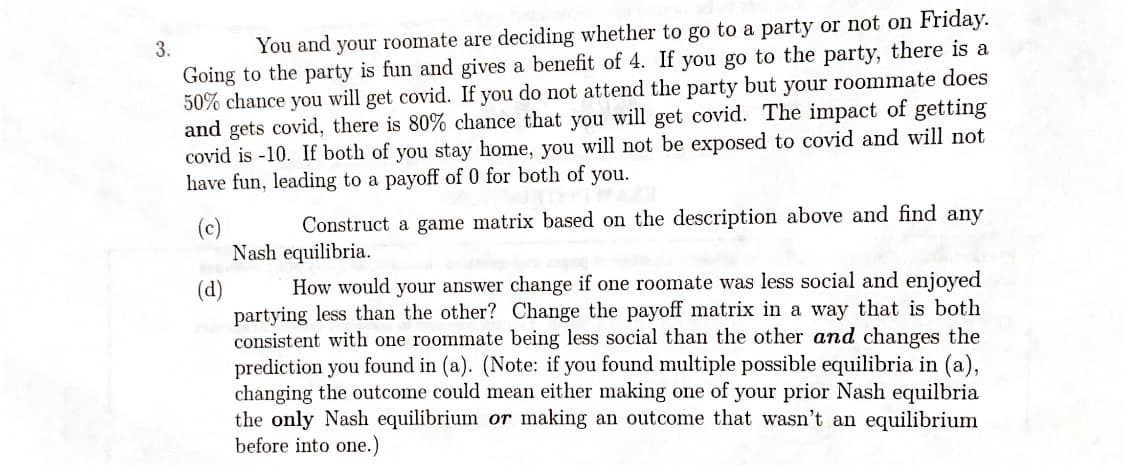3. You and your roomate are deciding whether to go to å pa. Going to the party is fun and gives a benefit of 4. If you go to the party, there is a 50% chance you will get covid. If you do not attend the party but your roommate does and gets covid, there is 80% chance that you will get covid. The impact of getting covid is -10. If both of you stay home, you will not be exposed to covid and will not have fun, leading to a payoff of 0 for both of you. Construct a game matrix based on the description above and find any (c) Nash equilibria. How would your answer change if one roomate was less social and enjoyed (d) partying less than the other? Change the payoff matrix in a way that is both consistent with one roommate being less social than the other and changes the prediction you found in (a). (Note: if you found multiple possible equilibria in (a), changing the outcome could mean either making one of your prior Nash equilbria the only Nash equilibrium or making an outcome that wasn't an equilibrium
3. You and your roomate are deciding whether to go to å pa. Going to the party is fun and gives a benefit of 4. If you go to the party, there is a 50% chance you will get covid. If you do not attend the party but your roommate does and gets covid, there is 80% chance that you will get covid. The impact of getting covid is -10. If both of you stay home, you will not be exposed to covid and will not have fun, leading to a payoff of 0 for both of you. Construct a game matrix based on the description above and find any (c) Nash equilibria. How would your answer change if one roomate was less social and enjoyed (d) partying less than the other? Change the payoff matrix in a way that is both consistent with one roommate being less social than the other and changes the prediction you found in (a). (Note: if you found multiple possible equilibria in (a), changing the outcome could mean either making one of your prior Nash equilbria the only Nash equilibrium or making an outcome that wasn't an equilibrium
Chapter7: Uncertainty
Section: Chapter Questions
Problem 7.3P
Related questions
Question

Transcribed Image Text:You and your roomate are deciding whether to go to a party or not on Friday.
Going to the party is fun and gives a benefit of 4. If you go to the party, there is a
50% chance you will get covid. If you do not attend the party but your roommate does
and gets covid, there is 80% chance that you will get covid. The impact of getting
covid is -10. If both of you stay home, you will not be exposed to covid and will not
have fun, leading to a payoff of 0 for both of you.
3.
Construct a game matrix based on the description above and find any
(c)
Nash equilibria.
How would your answer change if one roomate was less social and enjoyed
(d)
partying less than the other? Change the payoff matrix in a way that is both
consistent with one roommate being less social than the other and changes the
prediction you found in (a). (Note: if you found multiple possible equilibria in (a),
changing the outcome could mean either making one of your prior Nash equilbria
the only Nash equilibrium or making an outcome that wasn't an equilibrium
before into one.)
Expert Solution
This question has been solved!
Explore an expertly crafted, step-by-step solution for a thorough understanding of key concepts.
Step by step
Solved in 2 steps

Knowledge Booster
Learn more about
Need a deep-dive on the concept behind this application? Look no further. Learn more about this topic, economics and related others by exploring similar questions and additional content below.Recommended textbooks for you

